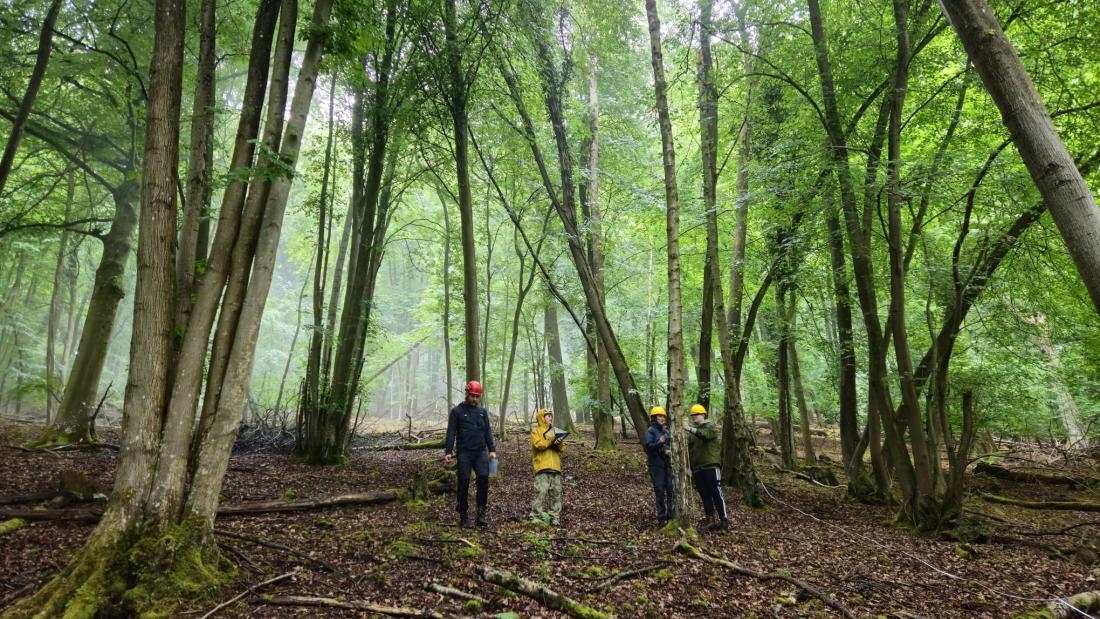In spring this year, a new research site was added to the Ecological Continuity Trust’s network of longitudinal ecological experiments: Lady Park Wood National Nature Reserve, located in the Wye Valley and straddling the England–Wales border. This 36-hectare ancient broadleaf woodland was designated as a research reserve as far back as 1944, to allow direct comparison between unmanaged and managed woodland compartments under similar environmental conditions. Over the past eighty years permanent tree transects and ground‑flora plots have been used to track the woodland’s response to ecological disturbances, providing data that describe shifts in species composition and woodland regeneration essential to conservation and restoration planning.
Professor of Forest Sciences at Bangor, John Healey, said:
This site has high potential for a wide range of ecological, forest science, and conservation research projects. The site lends itself to important ecological research on woodland resilience under the combined pressures of drought, tree disease, and severe deer and wild boar impacts, even with potential acceleration to a whole ecosystem tipping point.
Monitoring of the extensive set of permanent sample plots in the woodland has now been taken on by a new collaborative partnership between the University of Liverpool and Bangor University. Led by Andrew Hacket-Pain, Freddie Draper and Belen Fadrique (Liverpool), and Marielle Smith and John Healey (Bangor), the team of ten researchers—including MSc students Ciaran Gatenby and James Harding— made substantial progress in their latest remeasurement campaign. Over a week this May, they re-located the original 20-metre-wide canopy transects laid out in 1944, recorded diameter-at-breast-height of veteran beeches, oaks, and coppice stools and surveyed 30 ground-flora plots to quantify seedling germination and sapling recruitment.
MSc student James Harding said:
"I had a great time volunteering with the team at Lady Park Wood and it felt meaningful to play a small part in such a long-term project. I learnt a lot about the intricacies of ecological surveying and it was fascinating to see it in practice outside the classroom, with all the challenges of condensing a complex ecosystem into applicable data."
Connecting Lady Park Wood to Bangor’s ongoing longitudinal forest research
The Ecological Continuity Trust is a UK charity that supports and maintains long-term ecological experiments across a network of 38 core research sites. From these sites, it generates robust, decades‑long datasets to inform evidence‑based conservation. Bangor is already part of this network through BangorDiverse, a longitudinal forest experiment established in 2004 at the Henfaes Research Centre under the direction of Andy Smith. BangorDiverse investigates how combinations of tree species influence key ecosystem services such as flood mitigation, water regulation, and biomass productivity.
Bringing Lady Park Wood into the network expands Bangor’s forest research and reinforces its collaboration with the University of Liverpool. It adds a long-established site to ongoing research into woodland resilience under pressures from climate change, tree disease, and herbivore activity. MSc student Ciaran Gatenby reflected:
“A highlight of this fieldwork was witnessing—both with eyes and ears—a huge tree fall to the ground. The contrast of the quiet birdsong on a windless day interrupted by the colossal creak and smash of a mature lime tree falling from the canopy was astonishing.”

